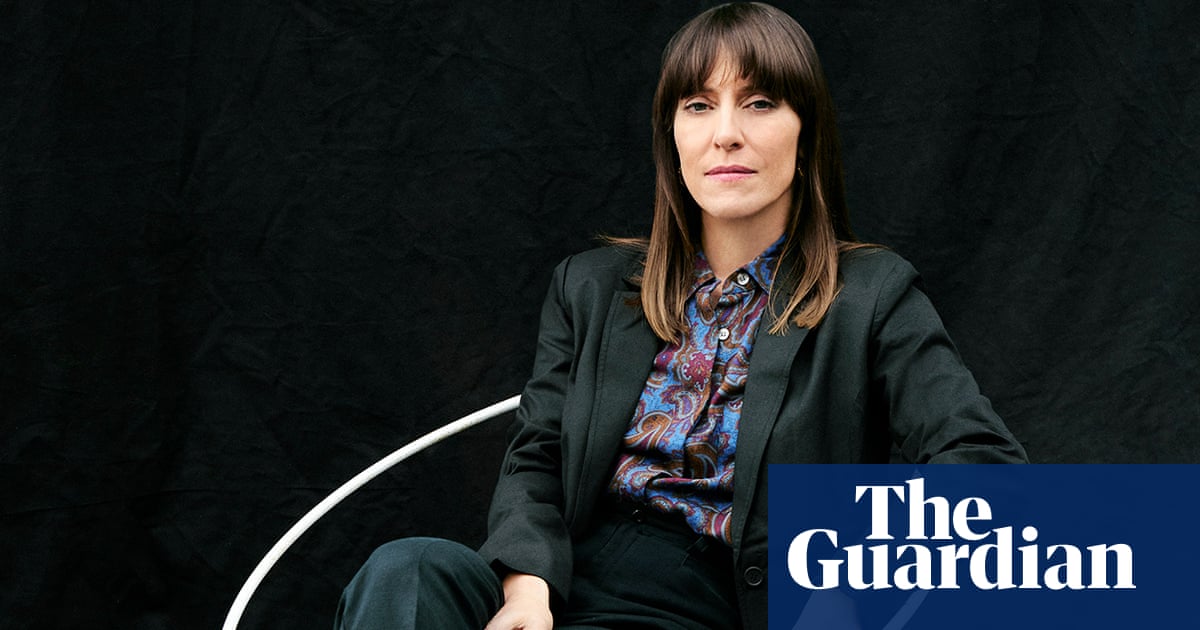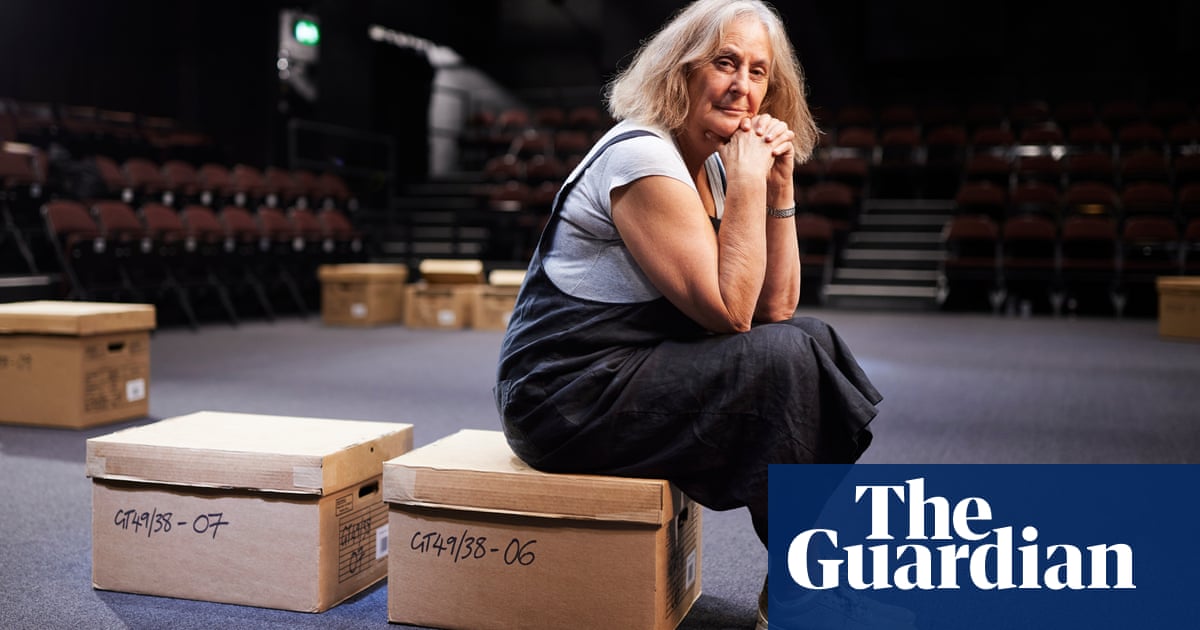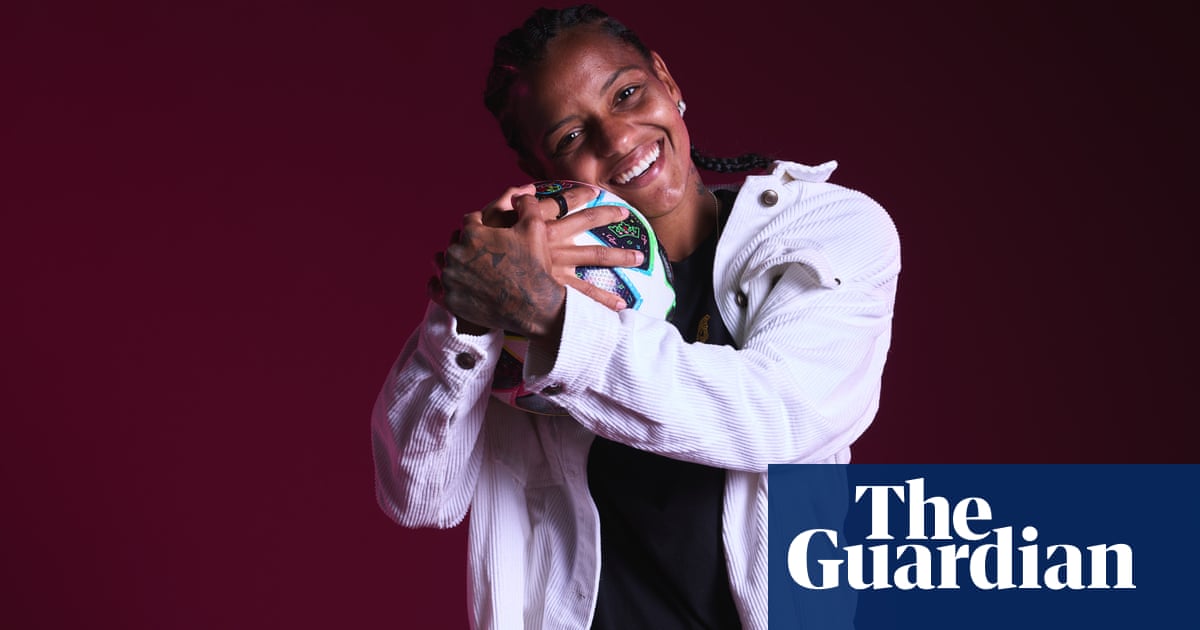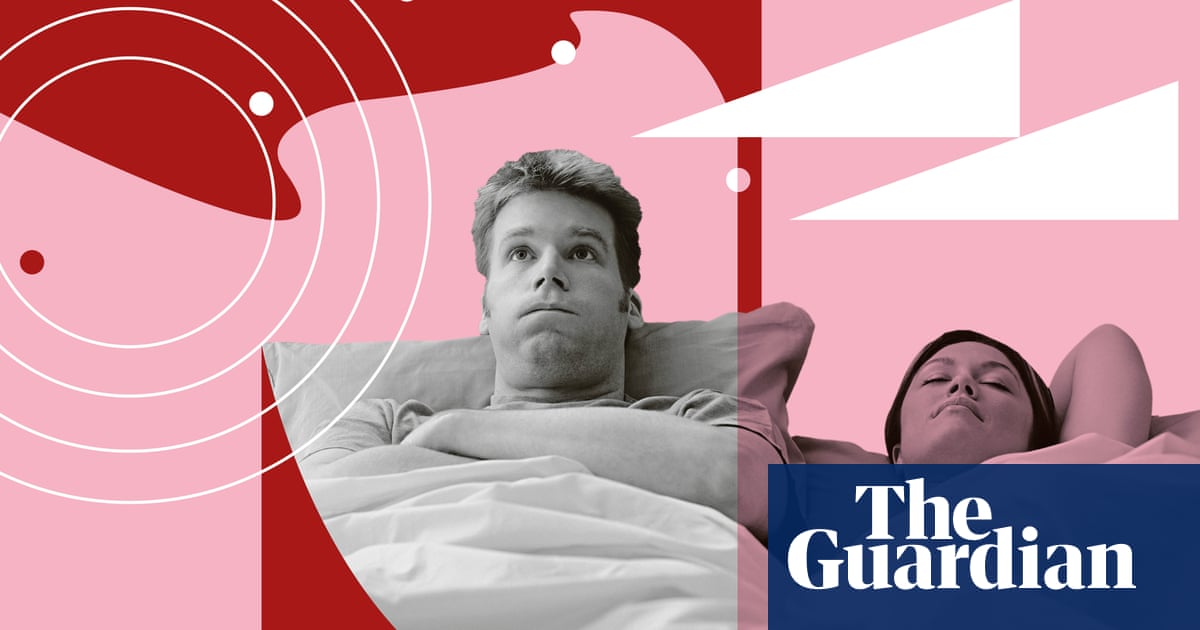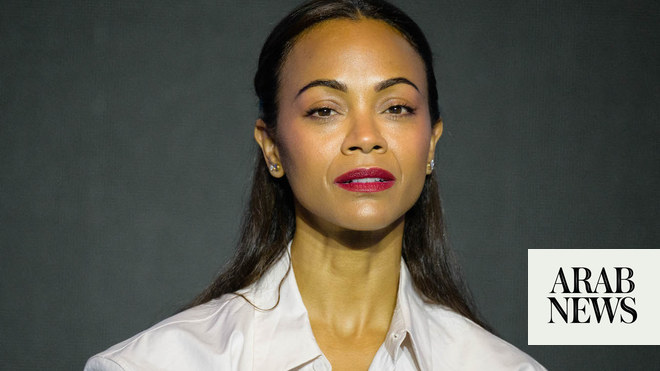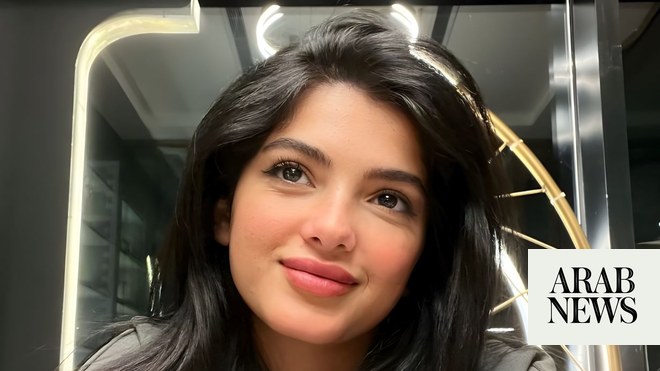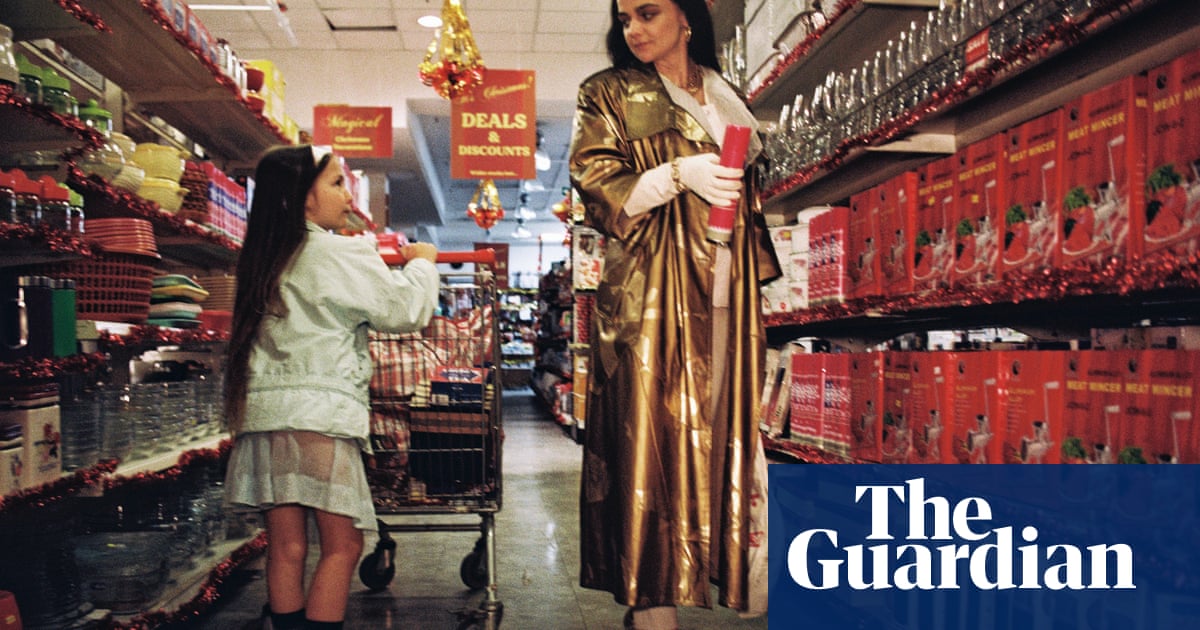
To reach Luna Carmoon, who is at the other end of a banquet table tucking into her vegetable pie, I have to shuffle sideways along the narrow gap between the seating and the wall. This means 10 seconds elapse between us spotting one another in the London pie-and-mash shop and finally greeting each other across the table. Then I have to shuffle all the way out again to order at the counter. The 26-year-old film-maker, who has thick, frizzy orange hair, might have engineered the whole situation for maximum cringe. “I always make things weird,” she says with a naughty smile.
The proof is in the pie: her debut feature, Hoard, which won three prizes at last year’s Venice film festival, is one of the stickiest, itchiest and most unsettling movies since the heyday of Harmony Korine. It begins in the early 1980s, with young Maria being mollycoddled by her mother, a loving, smothering hoarder who makes nocturnal trolley runs to nearby skips. When the child is taken into care, the film leaps forward to show teenage Maria now living a sedate life. Until, that is, the arrival of her sweaty, shark-eyed foster brother Michael.
Hoard is set in the same patch of south-east London where Carmoon has lived since her parents (her mother a hairdresser, her father a plumber) divorced when she was 10. She is still there, in fact, living in one house with her mum, sister and grandfather. But the film is not her life story. “Maria and I are nothing alike,” she says between mouthfuls of pie. “Except that I’m as gross as she is. We’re both quite animal and carnal. I don’t have any shame about that. One of my friends taught me that embarrassment is a wasted emotion. I love it when things are awkward. Maybe I’m a sadist. That’s what my grandad calls me whenever I pluck his eyebrows.”
Nor is Maria’s mother based on anyone in Carmoon’s family, despite the film ending with a home-movie clip of her late grandmother. “My nan was eccentric – there were dolls hanging from the ceiling – but she wasn’t a hoarder. We were so close. She was as interested in my dreams as my waking life. I have, like, 11 dreams a night, which is why I’m always exhausted. I remember the details like nobody’s business. They bleed into my weeks.” Then she casually drops one of the coruscating phrases that come naturally to her: “I’m a VIP of the night-time life.”
If Hoard is full of moments, sounds and sensations that make you tingle, then a chat with Carmoon has much the same effect. During our hour together, she describes “a grey, anaemic lemon”, refers to her post-Covid sense of smell “coming back in shimmers”, and claims that her great-grandmother was a psychic sex-worker who volunteered tips on unsolved crimes. As with the film, so with its maker: you feel inundated by the hoarder-like density of texture and detail. “I’m not spiritual,” Carmoon continues brightly. “I think we’re all computers. Fleshy machines. But I’m in touch with what I call ‘the other’. That’s the feeling I’m forever trying to chase in my films: the unearthly, the untapped.”
Peter Strickland, director of the 2018 British horror In Fabric, is a fan. “The film evoked much more than my eyes and ears could take in,” he tells me. “I felt as if I was physically in those spaces. It’s the lighting, the dialogue, the sense of grubbiness. Not many directors do that. Nicolas Roeg and Donald Cammell did it in Performance. And John Waters, of course. It’s not an easy watch: there were points where I wanted to turn away. But I’ve always liked the idea of climate in a film, and she’s very good at establishing that.”
One of Carmoon’s tricks while shooting Hoard was to spritz the set with a distinctive fragrance. “I love how Elizabeth Taylor had a scent for every film she made.” Chances are the star of Cleopatra never wore Secretions Magnifiques, which combines sweat, saliva, blood and sperm. “I sprayed it in the hoarding house with Maria and her mum. I only told one other person what I was doing. I stopped spraying it when the film switches to 1994, but as soon as Maria enters her delirium, I started again. People were like, ‘Ew, that weird stale smell is back!’” Why keep quiet about it? “When you’re making a film, you’re giving a lot of yourself. I needed to hold something back.”
Joseph Quinn, the Stranger Things star who plays brother Michael, remembers the smell well. “It crept up on us. I don’t know when I first noticed it. Luna wanted to create this immersive sensual overload, and using smell was a wonderful way to do that. It was potent but it enhanced the experience.” Seeing Carmoon direct, he says, was “like watching a bird in flight. She was born to do it. Luna is the most cine-literate person I’ve ever met. Her intention was to make the film in the aesthetic of British social realism but through a European lens.”
The images of working-class life in one of her shorts, the clammy coming-of-age tale Shagbands, were initially greeted with scepticism by the suits. “I was told my locations weren’t Fish Tank enough,” she says, referring to Andrea Arnold’s gritty 2009 Essex drama. “But I live on an estate. They’re not all high rises. And why can’t those stories be colourful? Look at films like Pressure and Babylon: they have electricity running through them.”
She thinks modern British cinema has a working-class problem. “I never meet anyone like myself. Usually it’s upper-middle-class rich kids whose parents are in the industry. Cos-players making poverty porn.” Consequently, she hasn’t always been treated with respect. “People don’t understand how stressful it can be if you don’t come from money. I’ve got no degree to fall back on. Cinema is my lifeline.” She was slighted by some of the higher-ups who failed to send her so much as a congratulatory text when Shagbands was accepted by festivals. “I’d given so much of myself to that film, and to not even message me … ” She looks away. “I find the industry cancerous. It makes me want to have a toxic jet-wash.”
Desperation set in when plans for her first feature were scuppered. “I got ghosted by the people I was working with,” she explains. In response, Hoard poured out of her in the form of a 20-page story, which she likens to “a suicide note”. Genuinely? “Yeah. I thought I’d leave it at the end of the bed, and people would be like, ‘She was so sweet when we spoke to her in the Co-op, and now she’s left behind this disgusting tale.’” Noticing my startled expression, she says: “Those thoughts are as mundane to me as, ‘I’ll stick the kettle on.’ I have them quite often.”
Although there was “venom” in her original story, Carmoon believes that “something beautiful bloomed from it. Maria and Michael are stunted like children, and I describe Hoard as a children’s film for adults.” She mops up her gravy with a last chunk of pie. “I love weird children’s films. I want to make something like Chitty Chitty Bang Bang one day.”
Hoard has been widely acclaimed, and Carmoon heard on the grapevine that producers are looking for similar scripts. “Once something does well, they’re interested. There’s an awful lot of fence-sitters. A lot of internalised misogyny, too. Some older women don’t like younger women, and that’s a real shame because my generation doesn’t respect a lot of men, but we are seeking validation from women all the time.” Hands raised, she bows down before an imaginary female exec.
At least she is hard at work on her next screenplay, which is partly a response to the sense of danger she has always felt around men. “Various things have happened to me. I’ll probably put them into my films. I’ve never felt safe with men.” Apart from the ones who worked on Hoard, that is. “I thought, ‘Where have these lovely termites been my entire life?’” Carmoon describes her new script as “my anti-man manifesto”. Rather inconveniently, she has acquired a boyfriend. “I’ve fallen in love for the first time,” she says, rolling her eyes at the irony.
Not that it has solved all her problems. “When I look at my male contemporaries, I feel they’ve been nurtured a bit better. Then again, I’ve got a big mouth. I’m a rottweiler with words.” It’s certainly rare for a first-time film-maker to lash out so vehemently. She even said recently that she “fucking hate[s] the last decade of British cinema”. When I mention this, she shrugs. “I don’t even care. I call myself the Amy Winehouse of film.” She nudges aside her empty plate. “I risk it for the biscuit. Always.”




